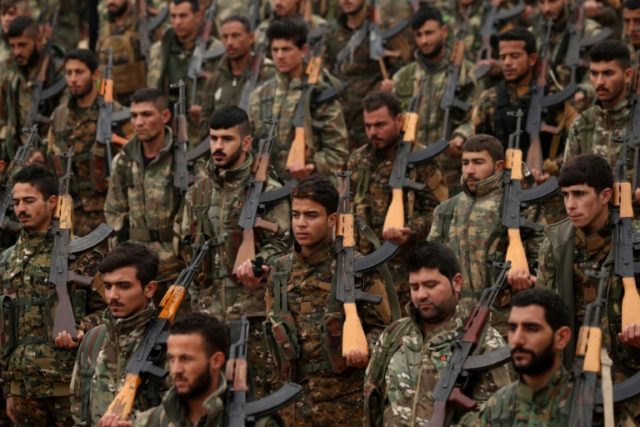“Battled-hardened” Islamic State (ISIS/ISIL) remnants in Syria “could likely” mount a resurgence in “six to 12 months” absent “sustained counterterrorism pressure” by American and local troops, the Pentagon’s inspector general (IG) warned in a report released Monday.
The office of the inspector general (OIG) at the U.S. Department of Defense (DOD) reported in its quarterly assessment [October 1 through December 31, 2018] of the anti-ISIS mission prepared for Congress:
[I]SIS remains a potent force of battle-hardened and well-disciplined fighters that “could likely resurge in Syria” absent continued counterterrorism pressure. According to DOD [U.S. Department of Defense], ISIS is still able to coordinate offensives and counter-offensives, as well as operate as a decentralized insurgency.
ISIS is still attracting an estimated “50” foreign fighters to Iraq and Syria each month, the IG added.
About 2,000 ISIS fighters are still operating in the group’s last remaining bastion in northern Syria, near the Iraqi border.
Acknowledging that the U.S. military has “low confidence” in the accuracy of the estimate, the IG reported that the United Nations believes there are still “between 20,000 and 30,000” ISIS jihadis in Iraq and Syria.
On Tuesday, Gen. Joseph Votel, the top American commander in the Middle East, told lawmakers he agrees with the Pentagon IG’s assessment that ISIS is likely to return without continued military pressure.
Votel confirmed that plans are underway for a U.S. military withdrawal, noting that the process will be slow and coordinated and allow the American-led coalition to set the conditions for an enduring ISIS defeat.
The general is the chief of U.S. Central Command (CENTCOM) — charged with military efforts in the Middle East and the Afghanistan region.
Citing CENTCOM’s response when the IG asked about the impact an imminent U.S. troop withdrawal will have on ISIS in Syria, the Pentagon auditor reported on Monday:
ISIS may conduct opportunistic attacks on U.S. personnel as they withdraw but will leverage the event as a “victory” in its media. ISIS remains an active insurgent group in both Iraq and Syria. … Currently, ISIS is regenerating key functions and capabilities more quickly in Iraq than in Syria, but absent sustained [counterterrorism] pressure, ISIS could likely resurge in Syria within six to twelve months and regain limited territory [in the country].
Currently, ISIS controls less than one percent of the territory it once held in Iraq and Syria. Votel told lawmakers the U.S.-led coalition and its local allies had degraded the jihadi group’s land from a so-called caliphate to about 20 square miles in Syria. Near the Iraqi border, ISIS remains a menace, the Pentagon IG stressed, echoing Votel.
While morale among ISIS terrorists has recently begun to trend “downward,” it remains “high” and that they seem “unfazed by Coalition airstrikes,” the U.S.-led coalition told the Pentagon auditor.
The IG acknowledged that the terrorist group was able to “temporarily” conquer about 10 miles of territory late last year outside its last remaining bastion in northern Syria, a testament to the lingering menace posed by the group.
Moreover, the Pentagon IG found that ISIS, considered one of the wealthiest terrorist groups in history:
[S]till generates revenue in Syria from limited oil smuggling operations, taxation, and criminal activities such as extortion and kidnapping in areas they do not control. In addition, ISIS continues to receive external donations and maintains cash reserves, and ISIS branches worldwide contribute varying degrees of support to ISIS in Syria.”
The IG revealed the Pentagon was unable to answer how the U.S. military will be able to accomplish its goals of “ensuring the enduring defeat of ISIS in Syria, the removal of Iranian militias and proxies, and a resolution to the Syrian civil war” after the withdrawal of American troops.
The general stressed that nearly 5,000 American troops would remain in neighboring Iraq with the ability to enter Syria if necessary. U.S. National Security Advisor John Bolton has also indicated a residual American force will continue to operate in Syria to deal with the threat posed by state-sponsor of terror Iran.

COMMENTS
Please let us know if you're having issues with commenting.